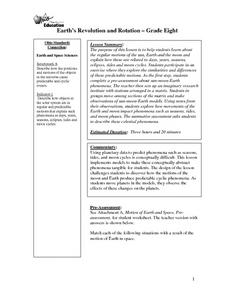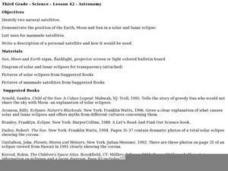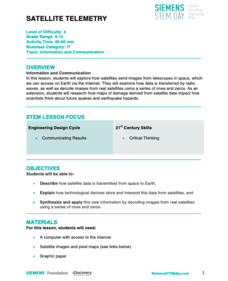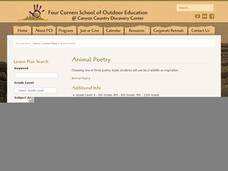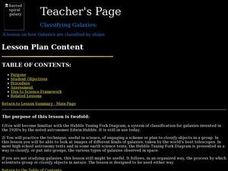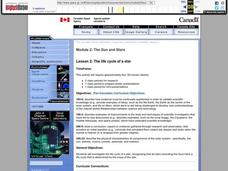Curated OER
Day and Night
Students using experiments try to demonstrate how observations can be affected by the cycles of night and day.
Curated OER
Earth's Revolution and Rotation
Eighth graders investigate the regular motions of the sun, Earth and the moon and explain how these are related to days, years, seasons, eclipses, tides and moon cycles. They participate in an exercise where they explore the...
Curated OER
Science - Lesson 42 - Astronomy
Third graders demonstrate the position of the Earth, Moon, and Sun in a solar and lunar eclipse. They list uses for manmade satellites and write a description of how a satellite would be use.
Curated OER
The Solar Cycle
Students research the solar cycle. In this Science lesson, students use the internet to investigate the solar cycle. Students produce a spreadsheet and graph from the information collected.
NASA
The Atmospheric Filter
What is the difference between a comet and a meteoroid? An educational lesson includes five demonstrations of how the atmosphere can inhibit our ability to measure many things in the galaxy.
NASA
Down to Earth
There are only 10 types of people in the world: those who understand binary and those who don't. The lesson includes four activities in which students learn binary, convert binary to images, understand CCD arrays, and interpret...
NASA
States of Matter
Water, one of the basic needs of humans, is found in all three states of matter on Earth; no other planet—that we know of—possesses this quality. Here is a unit that allows learners to explore through experimentation what it takes to...
PHET
Pre- and post-assessment (High School)
Need to gauge your pupils' understanding before the lesson begins? A base assessment includes short answer and drawings to determine pupil knowledge. Advanced assessment covers vector addition.
Discovery Education
Satellite Telemetry
Satellites require rockets to launch, but it doesn't take a rocket scientist to understand them. Future engineers learn about how satellites send data to Earth and how to interpret satellite images. They see how radio waves play a role...
NASA
Taking Apart the Light
Break down light into spectra. Scholars learn how atoms emit and absorb photons and come to understand how this process allows scientists to identify different atoms based on either absorption lines or emission lines. Learners then...
It's About Time
The Sun and Its Effects on Your Community
Why is the sun round? Examine this question, and others, with your pupils while teaching them how to live in a more earth-friendly environment. Pupils explore Sun composition and discuss how solar wind, sunspots, and solar energy affects...
American Museum of Natural History
Make Your Own Einstein Stationary
No need to be an Einstein for this project! Clever crafters add their name, address, and country to three Einstein-themed templates and create their own, personalized stationary. A great way to stay connected while social distancing.
Curated OER
Bubble-ology
Learners observe the visible spectrum while observing light hitting the surface of bubbles. They blow large bubbles and observe how the colors change.
Curated OER
Animal Poetry
Fourth graders write poems that use local wildlife as their inspiration. After a class discussion which produces a list of wildlife that pupils have seen in their town, a review of three types of poetry ensues. They look at how haiku,...
Curated OER
`Great Debate' Lesson Plan for Undergraduates
Students study the Curtis- Shapley debate which highlighted the view of human place in the universe. They examine the clash of these two astronomers in a debate which took place in 1920.
Curated OER
The KAO Telescope
Students explore the basic principles of the operation of the NASA's KAO telescope. They construct a simplified model of it using film canisters and other everyday objects. Step by step directions are included in plan.
Curated OER
Puzzling Planets
Students examine the concept of a solar system. In this research based lesson, students compare a star and a planet. They explain the requirements for life in a biosphere.
Curated OER
Classifying Galaxies
Students classify galaxies by their shape using the Hubble Tuning Fork Diagram.
Curated OER
Charting The Planets
Young scholars conduct different activities in order to unlock the secrets of the universe. They answer different questions that are written to assess knowledge of the planets. Information can be found on the internet to help.
Curated OER
Stellar Lunar Curriculum
Students engage in a lesson that covers the concept of different phases of the moon. They name the cycles of the phases of the moon while using flashlights to simulate the light of the sun. They research information about several...
Curated OER
Our Solar System to Scale
Middle schoolers calculate the diameter of planets and their relative distances. In this space science lesson, students discover how small or big the planets are in comparison to each other. Middle schoolers use cross multiplying...
Curated OER
Modeling the Big Bang and the Formation of the Universe
Sixth graders conduct an experiment to understand the Big Bang Theory. In this Big Bang Theory lesson, 6th graders will observe a balloon with confetti popping to emulate and analyze information related tot he Big Bang theory. Students...
Curated OER
Stars in Your Eyes
In this solar system worksheet, students answer 20 short answer questions about the stars, the planets, the sun and moon, meteorites and constellations.
Curated OER
The Life Cycle of a Star
Students investigate the life cycle of a star through research. Once research is complete, students prepare posters and present findings to class. Flash animation is included to help students visualize life cycle of star researching.



